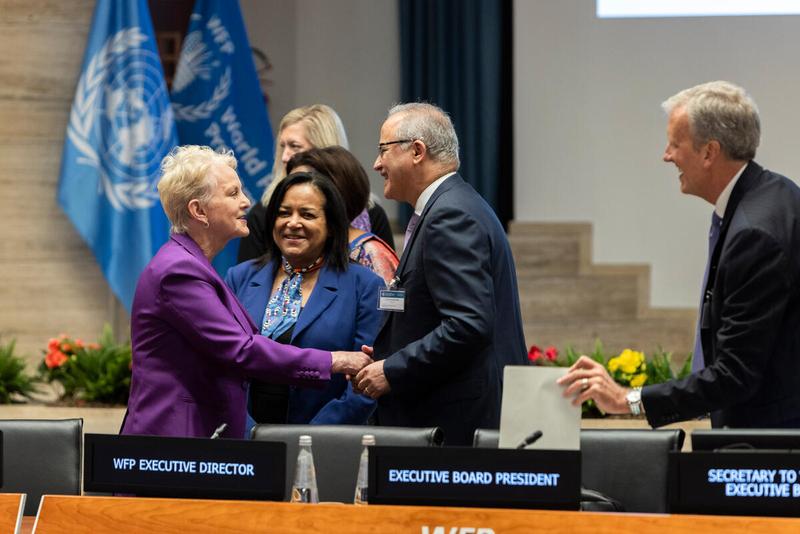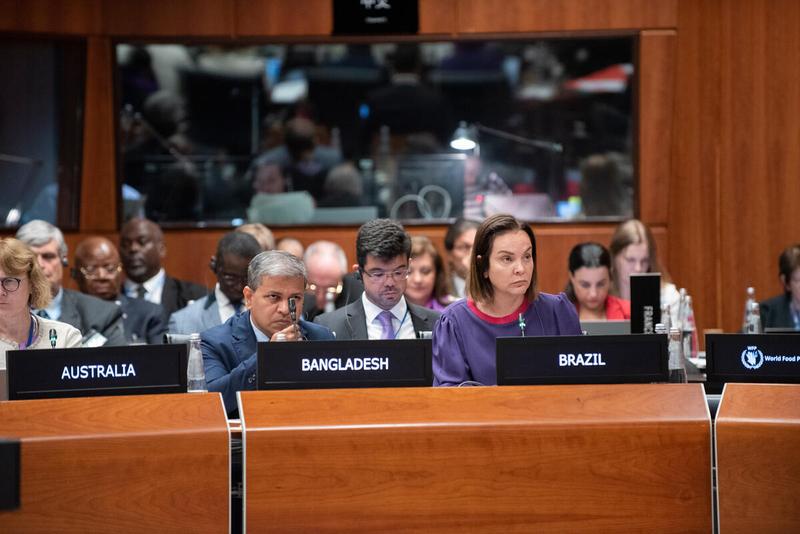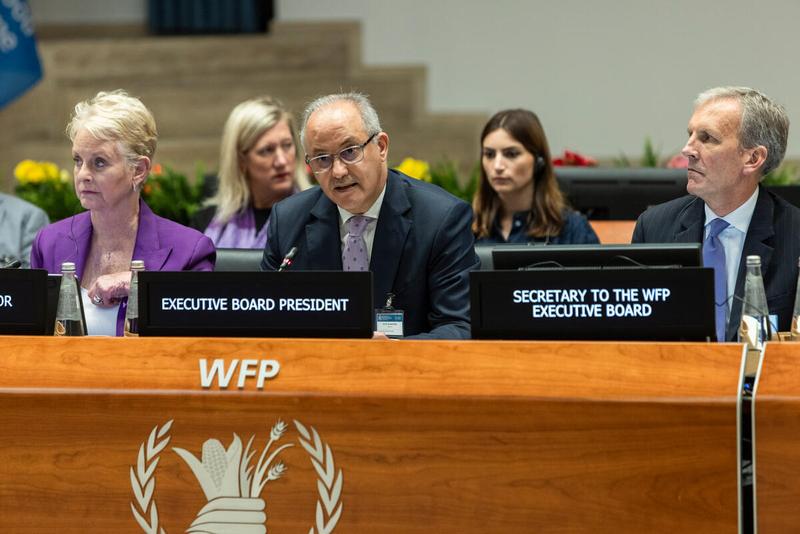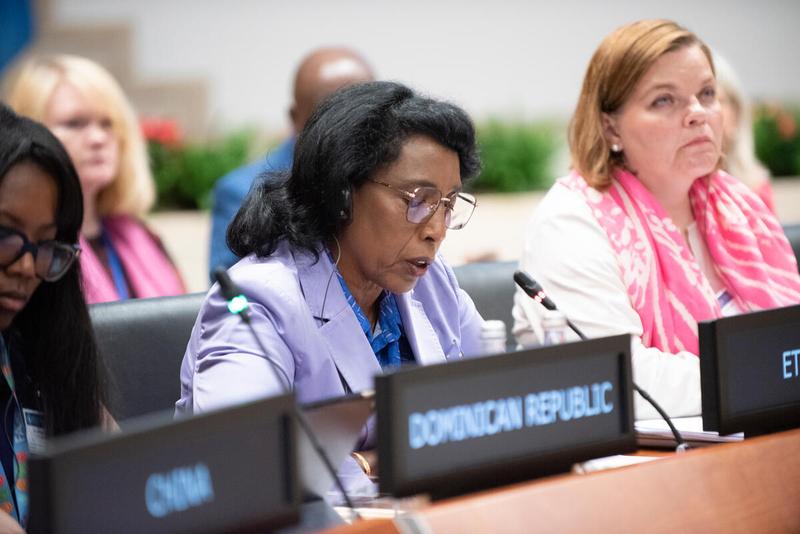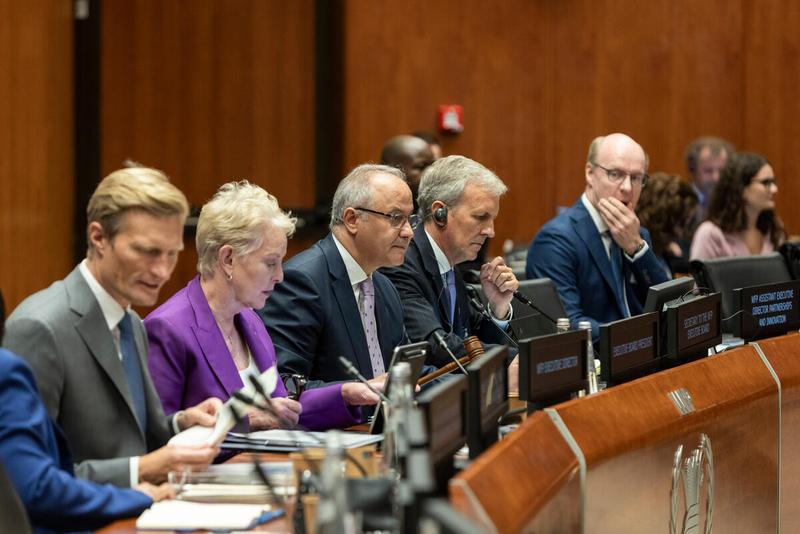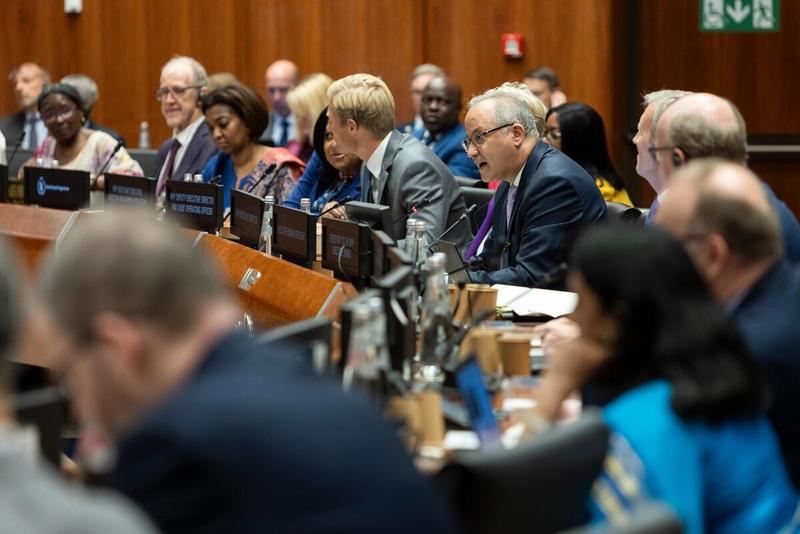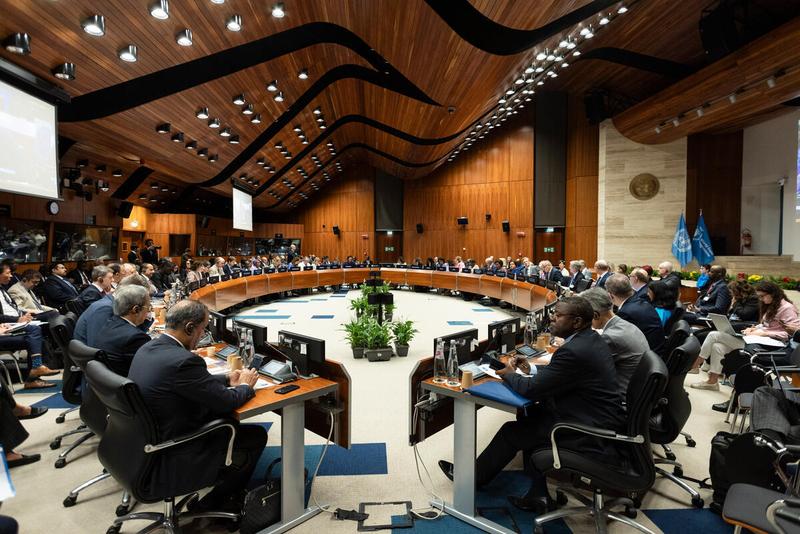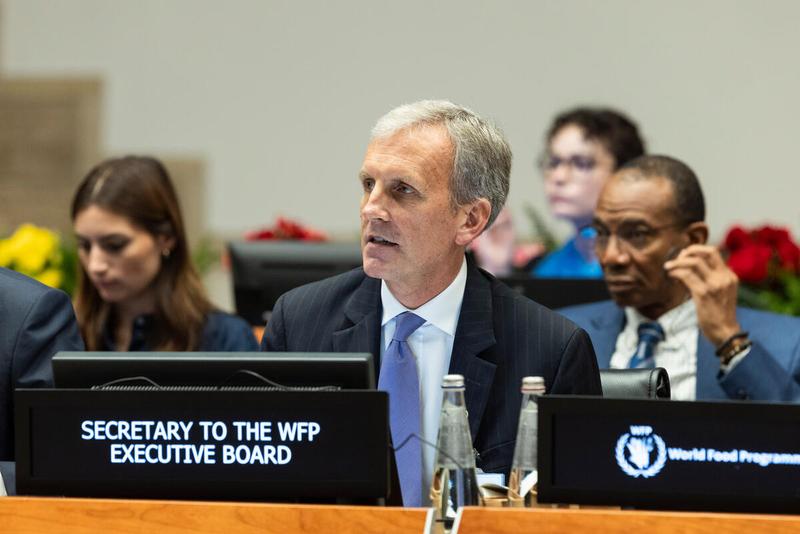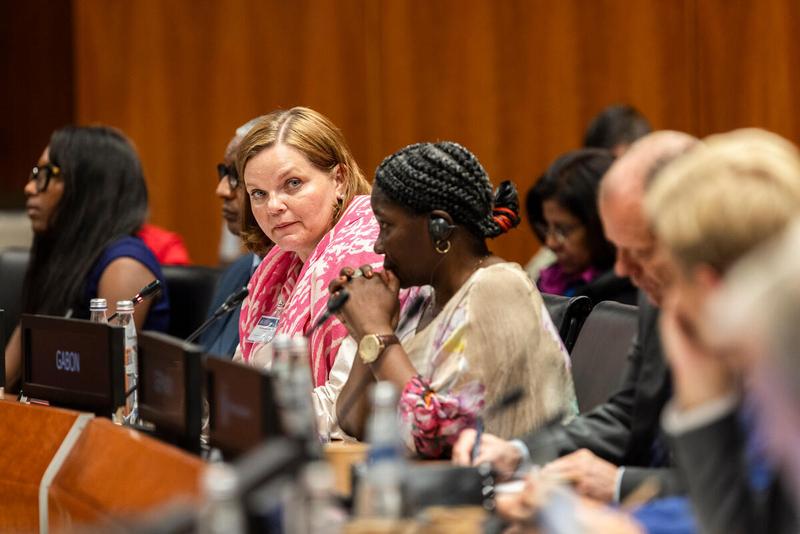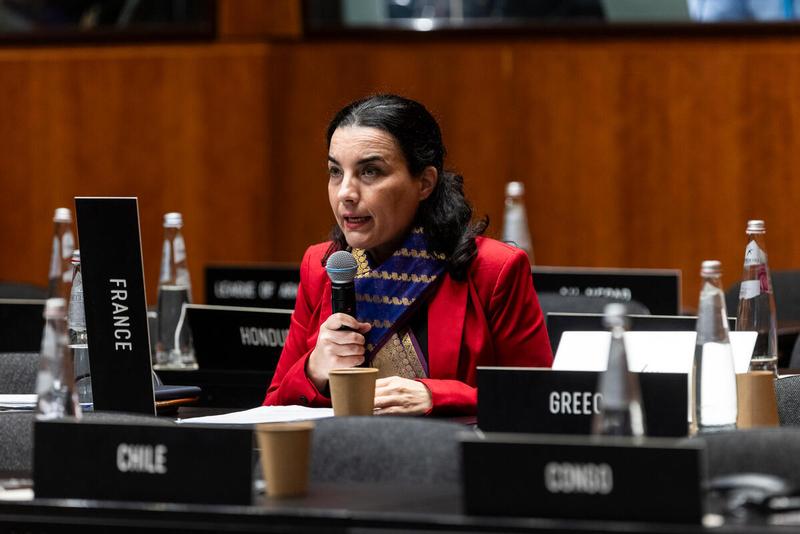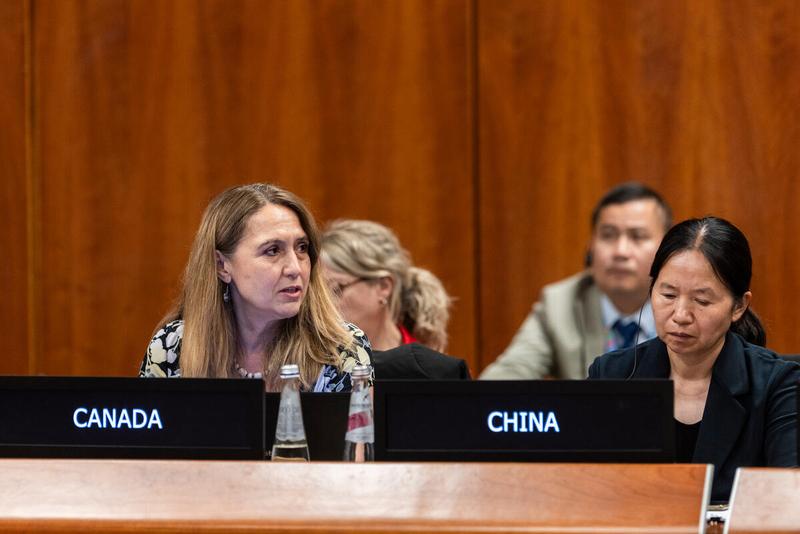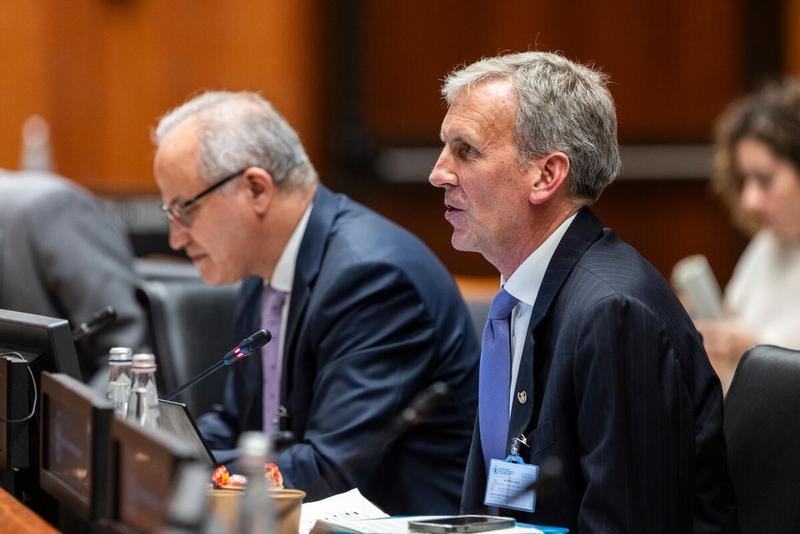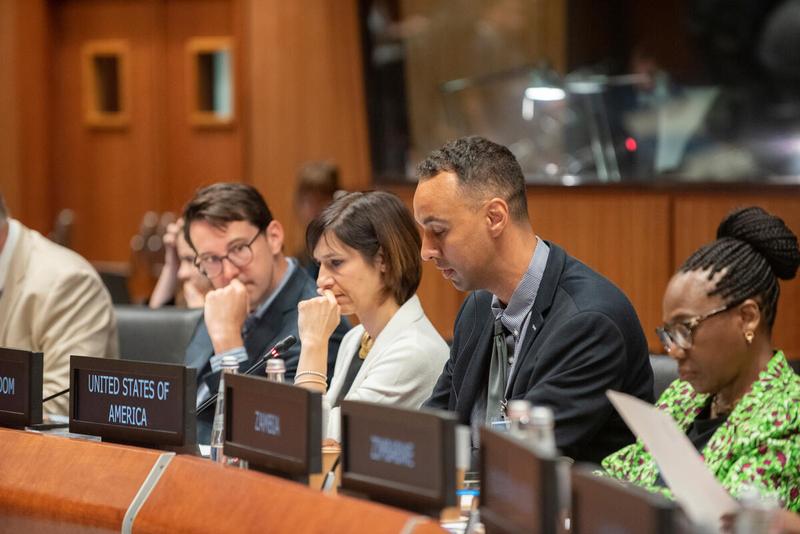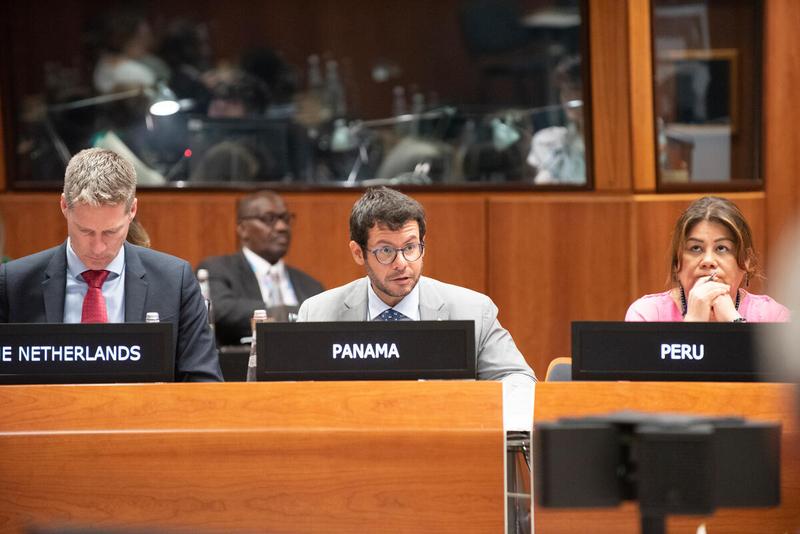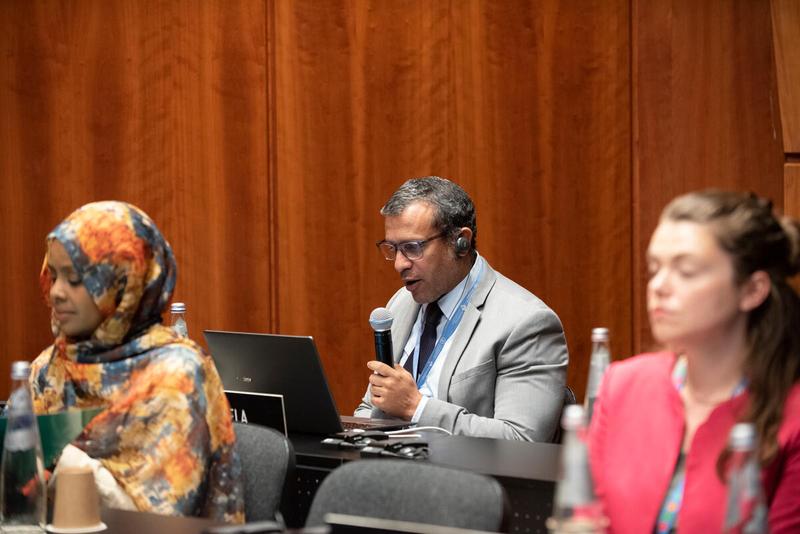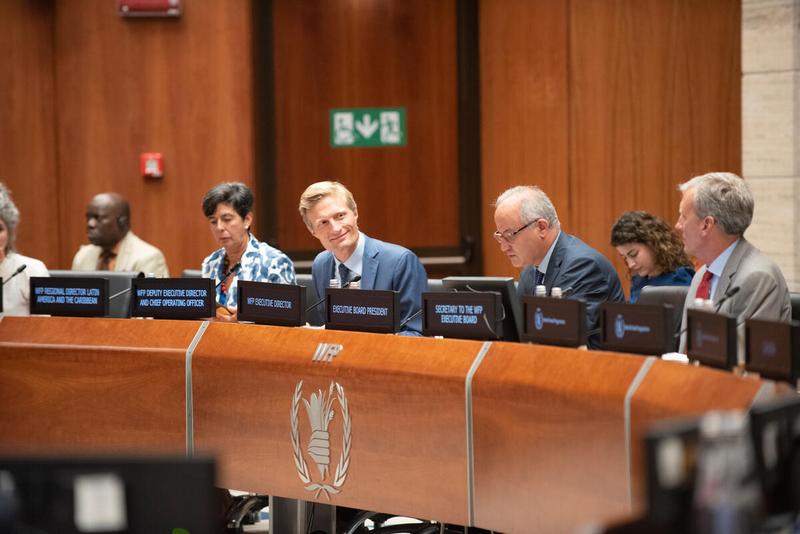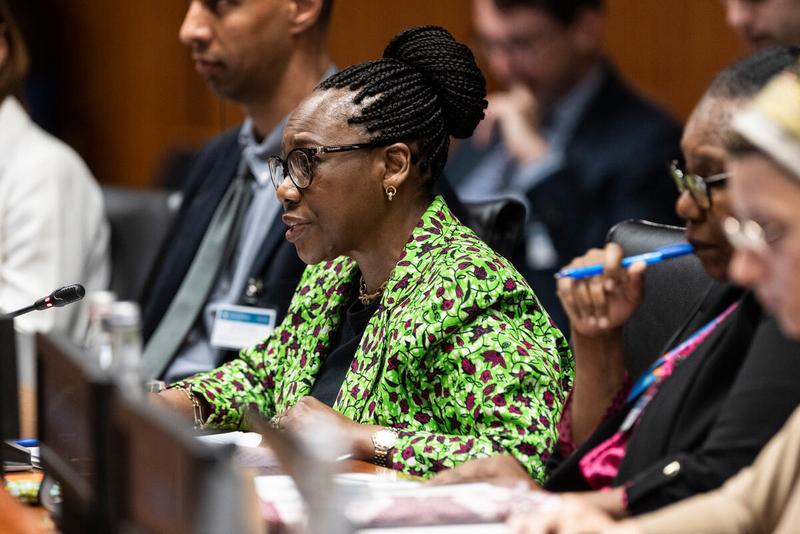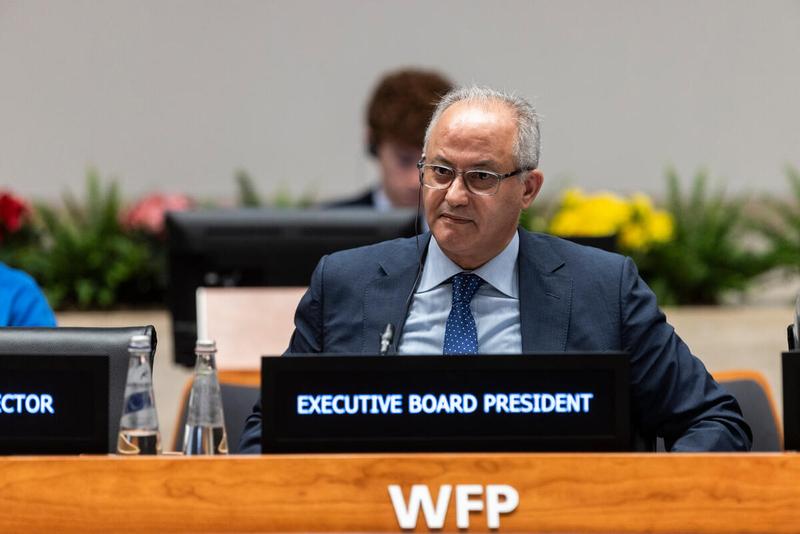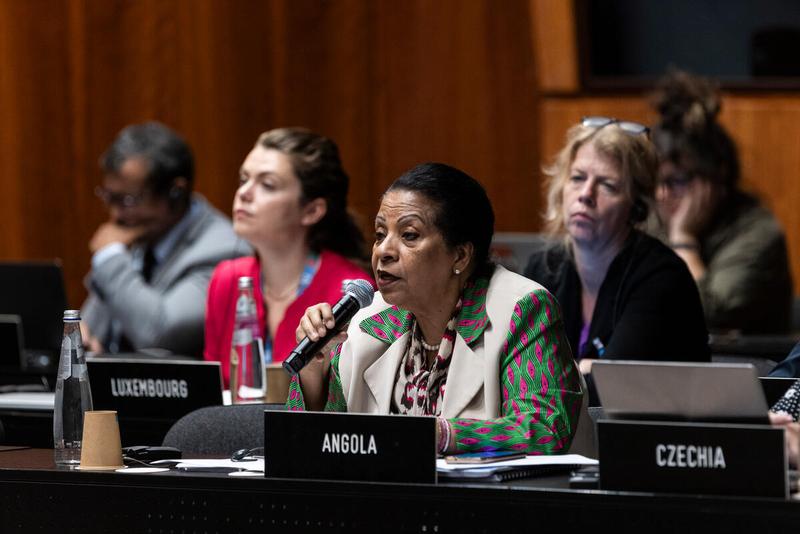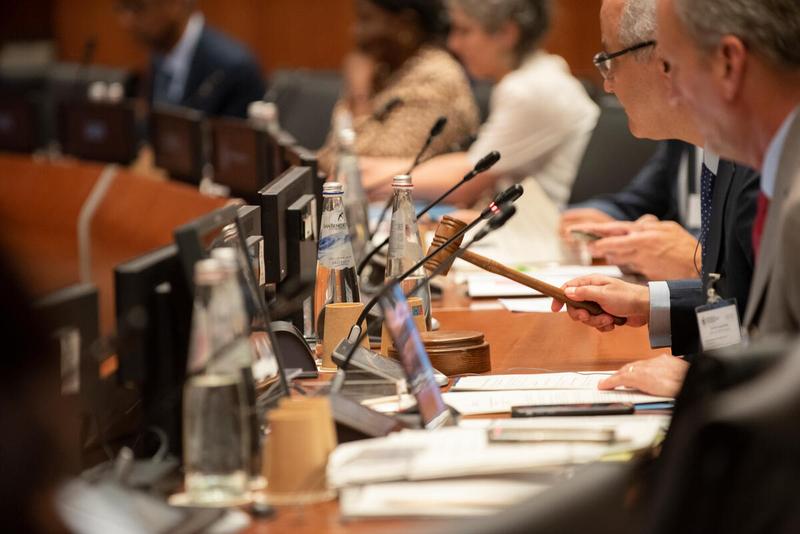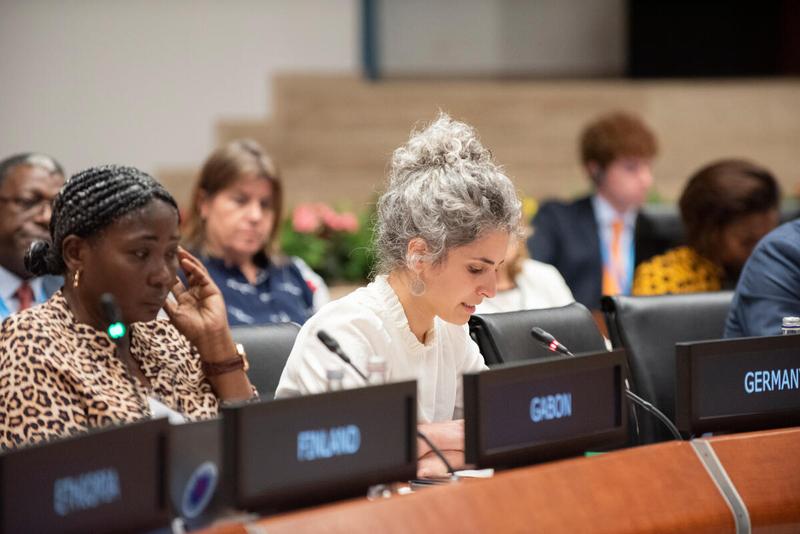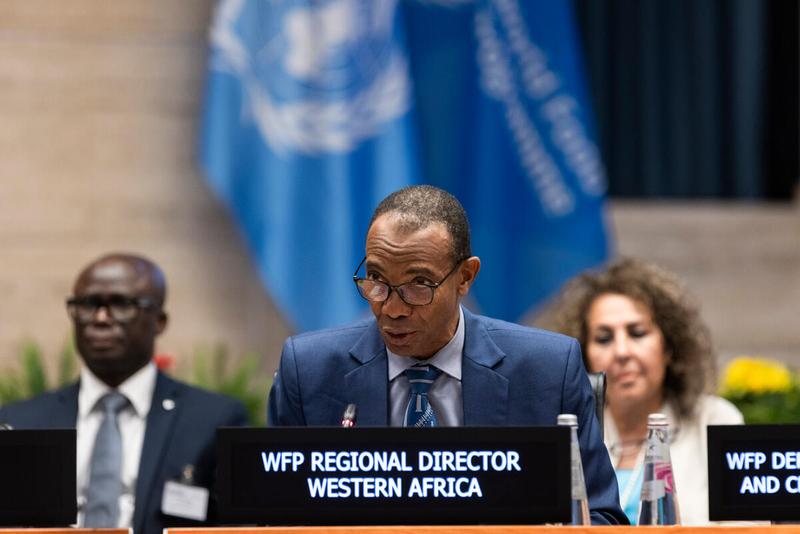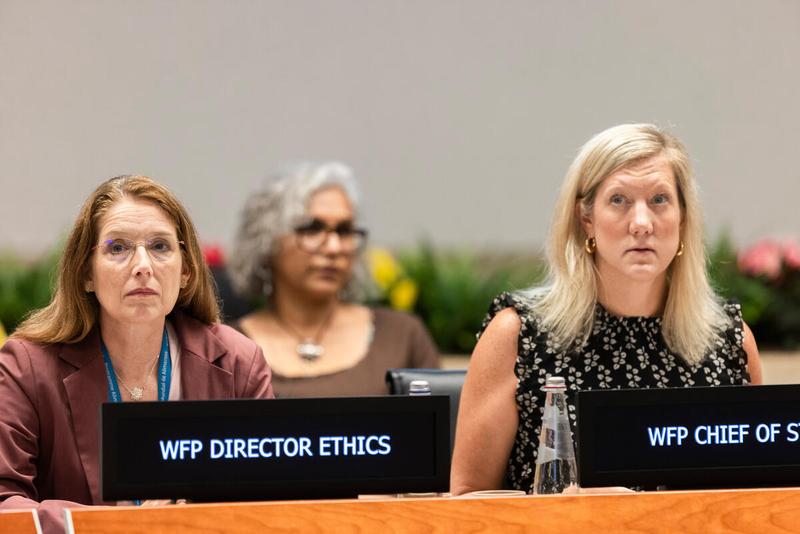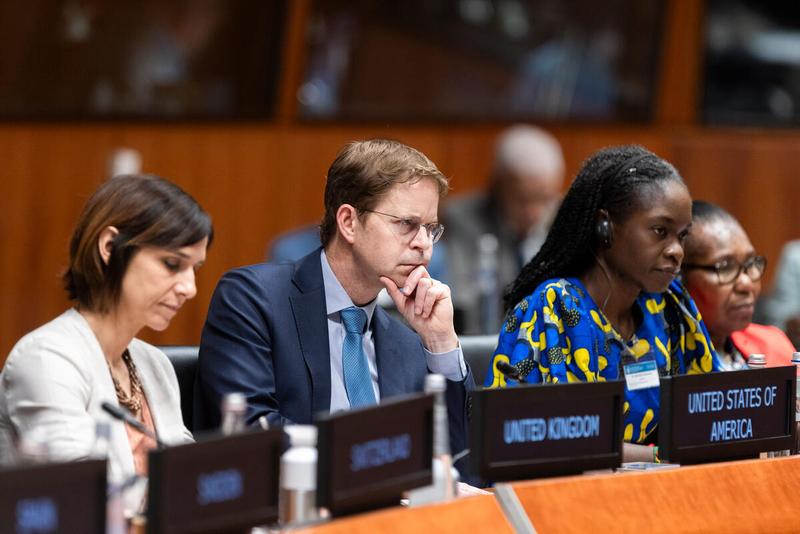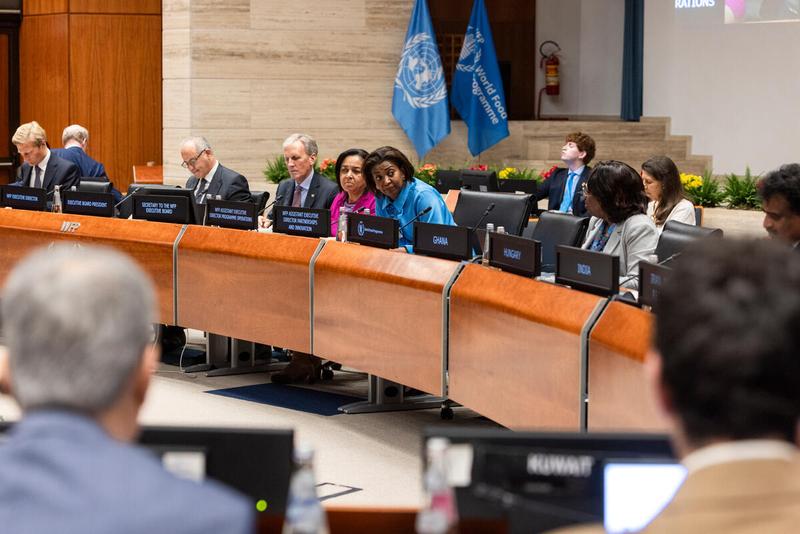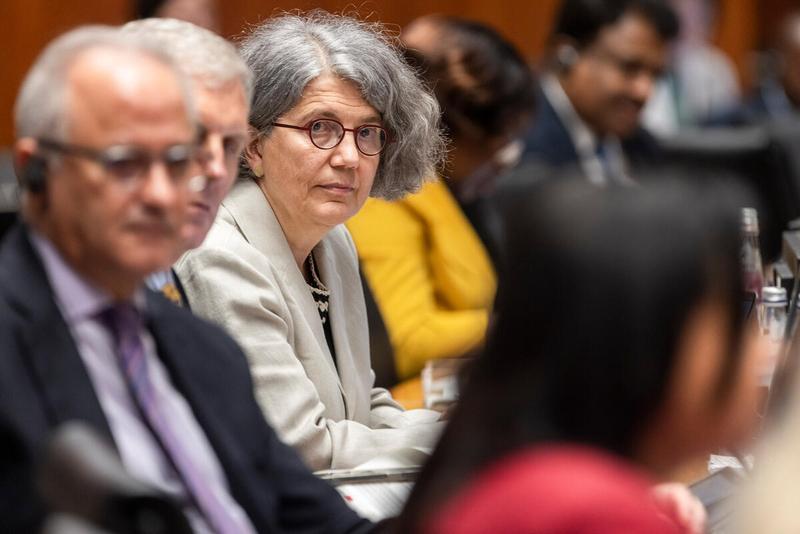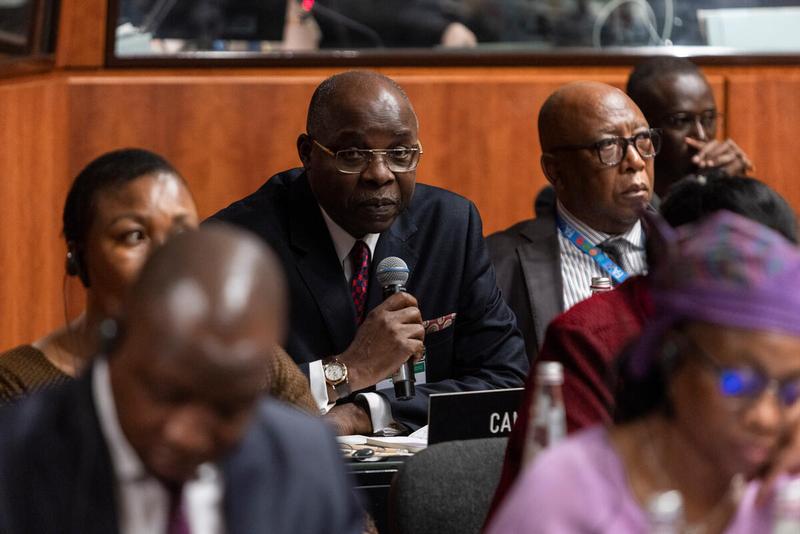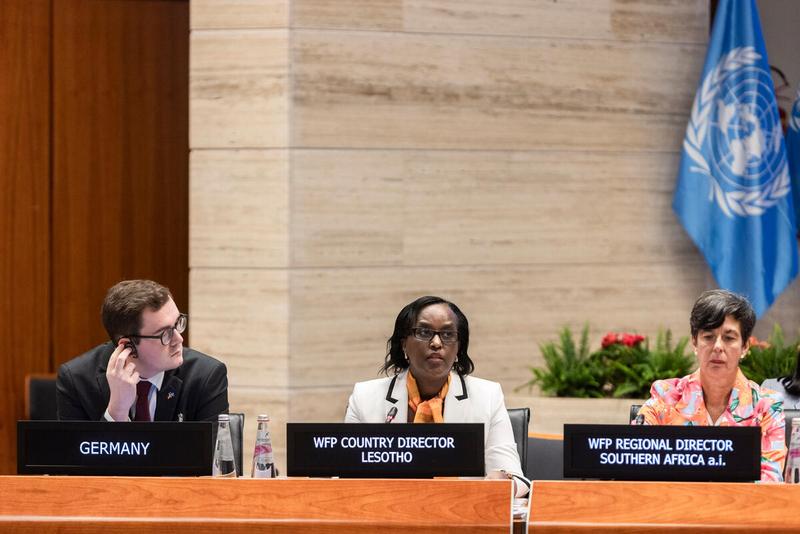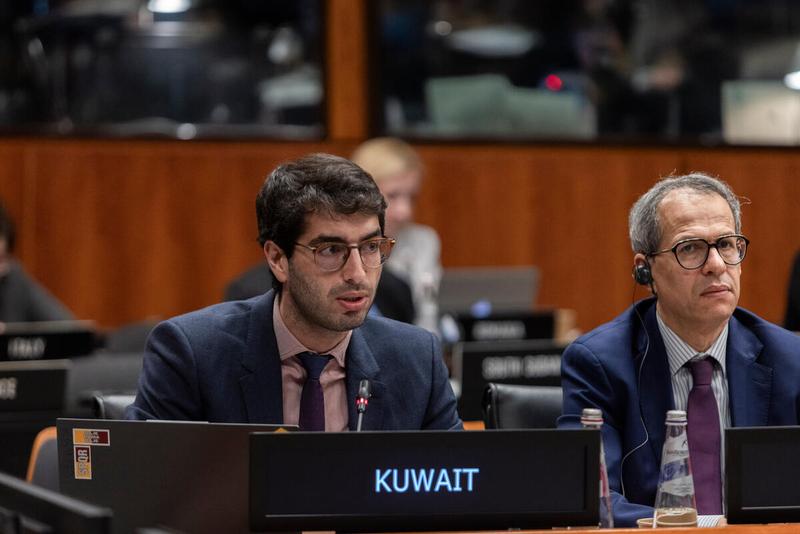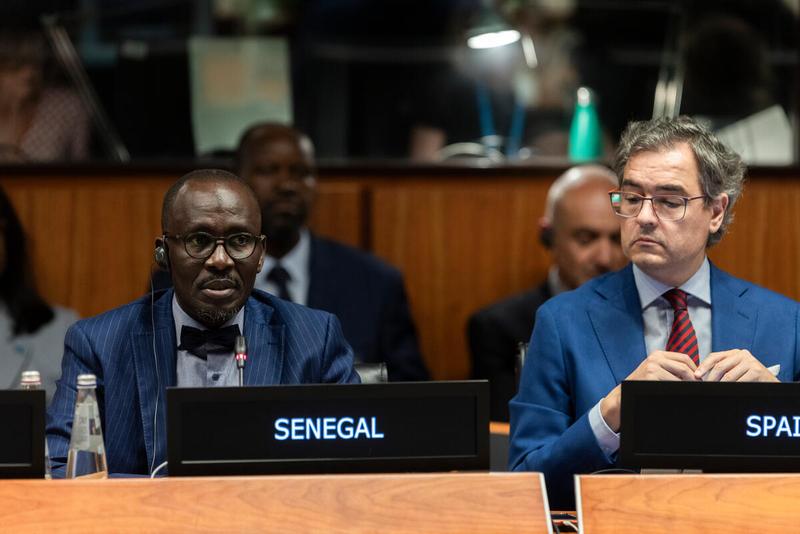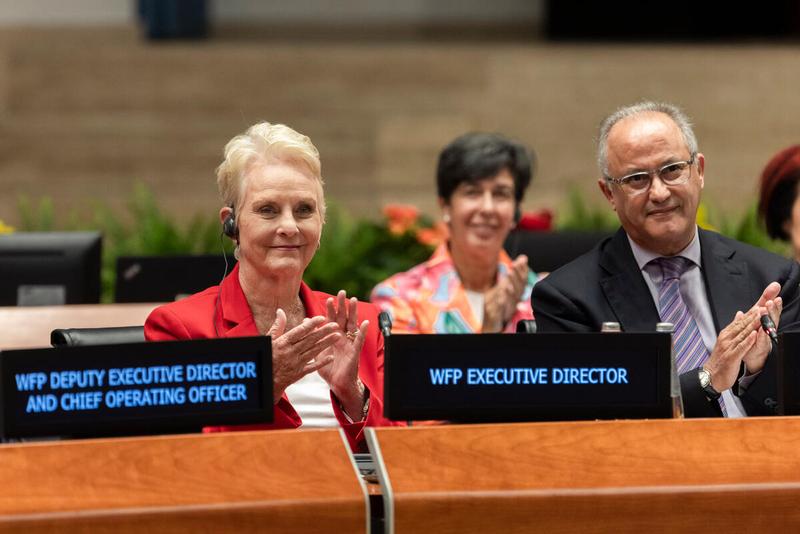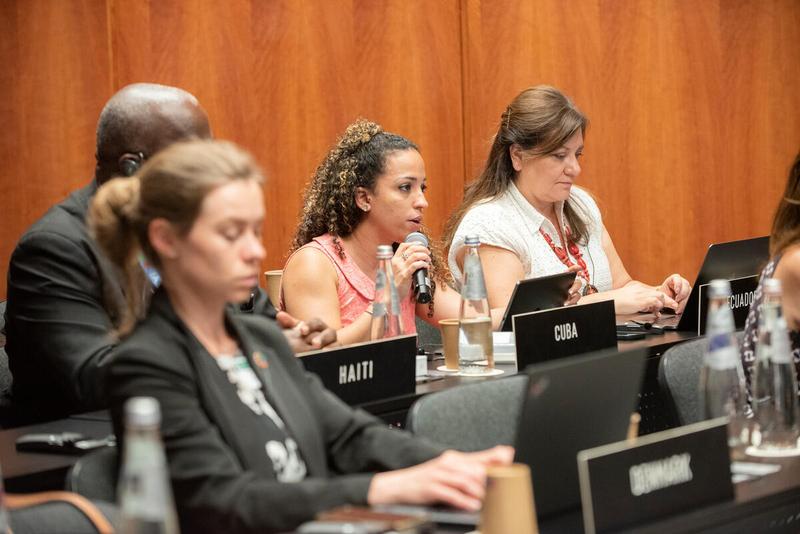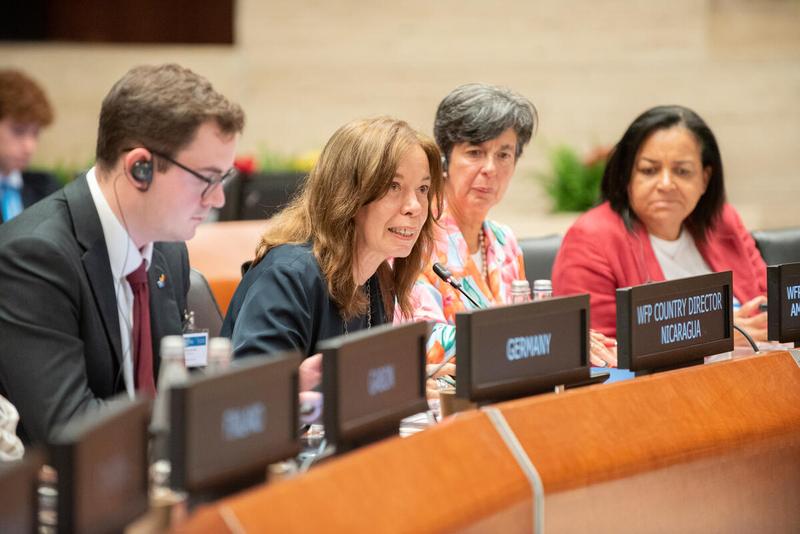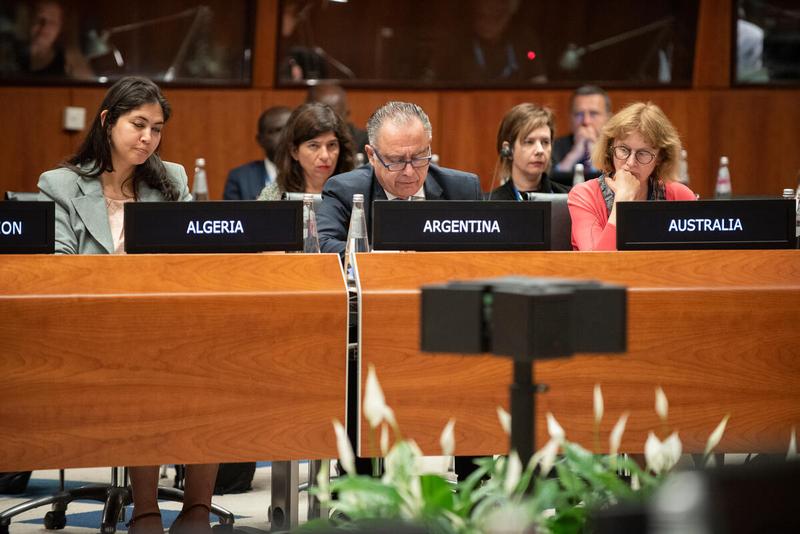The WFP Executive Board wrapped up its annual session last Friday morning.
The Board examined 42 documents with a focus on performance outcomes, accountability and oversight. Resource efficiency and adaptation to the new financial and operating landscape were the key thread running through the four and a half days of the session.
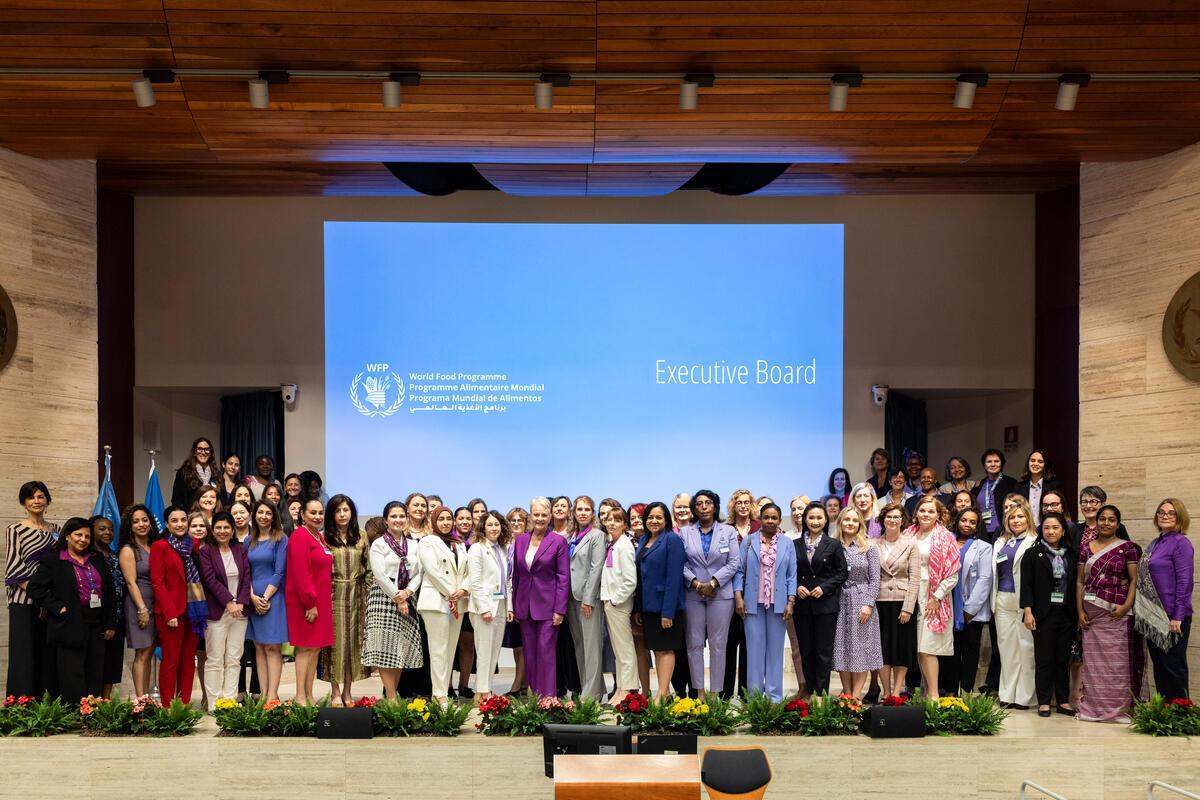
June 24, 2024. The WFP Executive Board commemorates the International Day of Women in Diplomacy. Photo: WFP/Matteo Minnella
On Monday, 24 June, the WFP Executive Director, Cindy McCain started her opening address by celebrating the International Day for Women in Diplomacy and congratulating all women attending the session for their public service and leadership. “When women are all at the table, when our voices are heard and our contributions are valued, we make better decisions and deliver better outcomes. […] You are truly an inspiration to young women and girls everywhere, and I hope many more will follow in your footsteps” she said.
The ED updated the Board on the ongoing organizational reform which has led to a new organizational structure that aims to sharpen the focus of corporate efforts to optimize efficiency and effectiveness, enhance collaboration and strengthen support to frontline operations. The ED informed the Board that the new measures included the reduction in the number of internal committees and will be complemented with the review of WFP’s regional configuration.
The ED then highlighted WFP’s efforts to protect, diversify and expand its funding base, including through private sector engagement and climate finance, and by building strong relationships with regional and international financial institutions such as the World Bank and the International Monetary Fund (IMF). ED McCain also announced that WFP is working on a new Partnership Strategy and on its first Innovative Finance Strategy which will focus on expanding the use of innovative financial mechanisms, such as debt swaps and blended finance to attract commercial capital for development projects and climate risk finance.
The ED reported on WFP’s significant funding shortfalls – the organization requires US$ 18 billion to keep operations running in 2024, while the latest forecasts is of US$ 8 billion – and highlighted the importance of assurance standards and controls that are at the front and center of operations.
Turning the spotlight on the protection of beneficiaries, ED McCain shared her priorities in her role as the 2024-2025 Inter-Agency Standing Committee (IASC) Champion on protection from sexual exploitation, abuse and harassment (PSEAH). Talking about operations, the WFP’s Executive Director drew attention to ongoing crises – including in Gaza, Sudan, the Sahel, Haiti, Yemen, Myanmar and Ukraine – and informed the Board about measures to support and protect the WFP global team who work on the frontlines to help vulnerable communities build a future free from hunger.
On resilience, the ED emphasized the huge potential of leveraging data and artificial intelligence to predict climate disasters through effective forecasts, risk analysis and early-warning systems, implement climate solutions and climate risk finance and protect communities before crises hit.
ED McCain concluded by calling on Board members and the governments they represent to use their political and diplomatic capital “to ease access constraints, provide safety and security for humanitarian workers and, above all, to help broker political solutions to end the conflicts that fuel so much hunger and suffering around the world.”
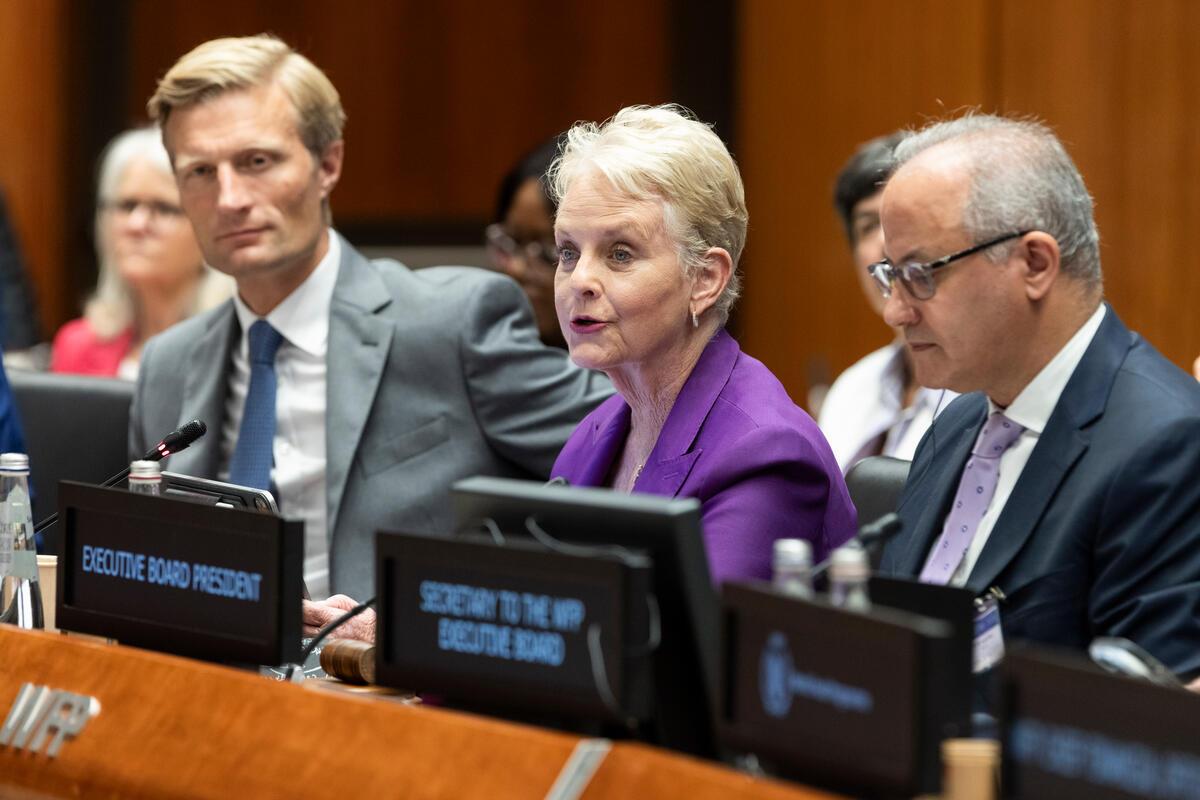
Intervention by Cindy McCain, WFP Executive Director. Photo: WFP/Matteo Minnella
On the opening day, in the afternoon segment, Dr James Mwangi, Group Chief Executive Officer and Managing Director of Equity Group Holdings, delivered a special address to the WFP Executive Board.
Dr. Mwangi shared lessons from his experience on financial inclusion. He showcased the innovative solutions provided by Equity Bank in support of smallholder farmers and provided his vision for bolstering the cooperation with WFP.
First, the Equity Bank’s Group Chief Executive Officer and Managing Director stressed the importance of identifying the reasons for financial exclusion and working to create resilience among smallholder farmers and support them to adapt to climate change.
Second, Dr Mwangi explained that collaboration with partners and financial institutions is the key to building capacity and sharing credit risks. This was what has led Equity Bank to become the largest integrated financial services group in Eastern and Central Africa.
Lastly, Equity Group has expanded its portfolio in agriculture lending, as reported by its Group Chief Executive Officer: “Five years later we are now at 16 percent and confident that we shall have 30 percent of our entire loan book in agriculture. Among the other financial services offered by Equity Group, Dr Mwangi mentioned leased warehousing and agro-processing funding, as well as health insurance.
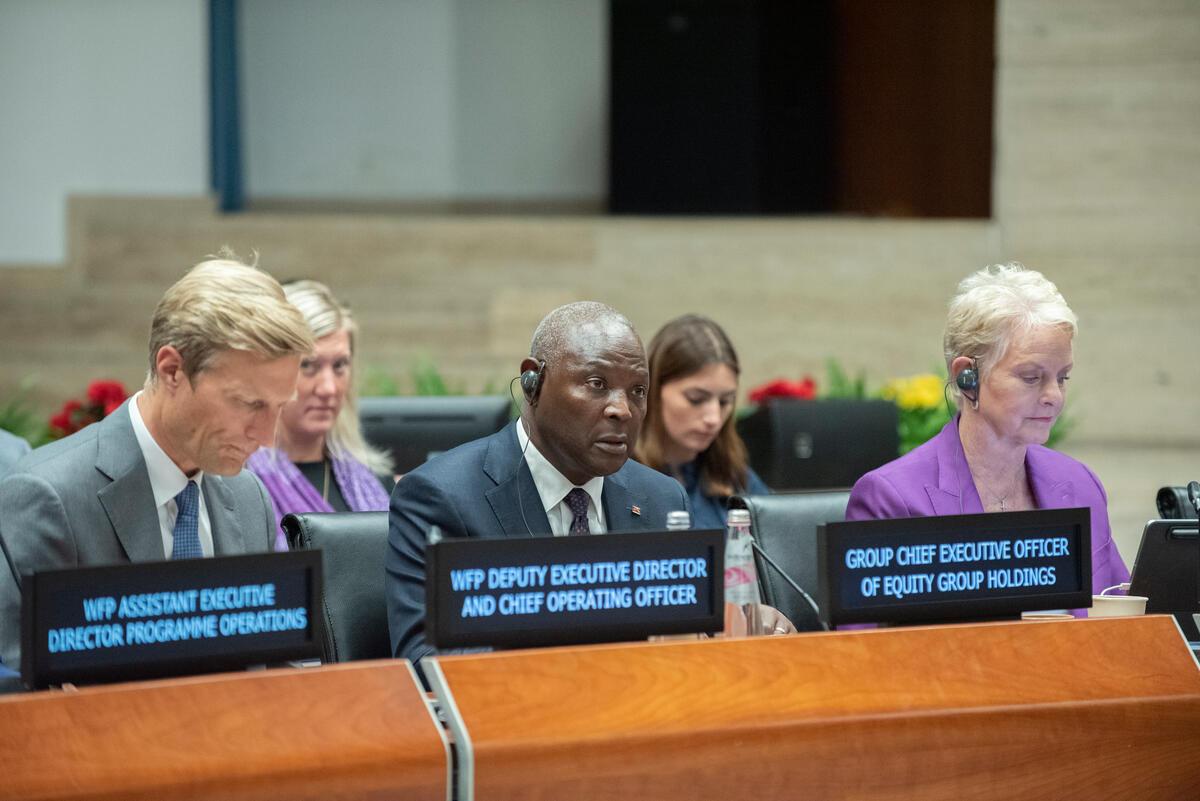
Dr. James Mwangi, Group Chief Executive Officer of Equity Group Holdings addressed the Executive Board. Photo: WFP/Daria Addabbo
On Thursday afternoon, Martin Griffiths, Under-Secretary-General (USG) for Humanitarian Affairs and Emergency Relief Coordinator (ERC), addressed the Board and shared his reflections on his tenure and how the international community can best address the current rise in humanitarian needs around the world.
Griffiths highlighted the crucial role of WFP in addressing multiple complex emergencies. The USG recalled that covering 30 percent of the whole humanitarian response plan, WFP is not only responsible for providing food, cash and commodities for about 150 million people in more than 120 countries, but it also leads the global logistics and telecommunications clusters and runs the UN’s humanitarian response depot and humanitarian air service. The Emergency Relief Coordinator then provided some examples of WFP’s vital and prompt humanitarian response, such as its intervention in Ukraine.
Martin Griffiths offered an overview of the current humanitarian challenges. The ERC reported on the difficulties in accessing, delivering and distributing humanitarian assistance to Gaza where half a million people were at risk of famine. The Emergency Relief Coordinator also expressed concern over the conflict in Sudan and denounced the “absence of firm leadership globally to choose dialogue and negotiation instead of violence to resolve differences”. There is “an erosion in respect for international humanitarian law and impunity has never been so widespread”, said Griffiths. He added that in this regard the situation is alarming worldwide as there have been “more aid workers killed in this last six months than in the previous 12 years”.
On underfunding, the Under Secretary General alerted the Board that just 16 percent of the requirements for humanitarian response had been received at global level for this year. “It has never been so low. And it is not actually a sustainable way of doing business. On the positive side, the USG commended the current unprecedented level of consensus, unity and partnership among humanitarian agencies. Griffiths noted that humanitarian diplomacy and mediation have become more common today and provided some examples such as the Black Sea Grain Initiative amongst others. Finally, the ERC spent a few words on climate and localization projects, giving some small, good news, since the last Conference of the Parties (COP). Griffiths informed that some climate adaptation funds are beginning to reach front line communities in Somalia and mentioned the flagship initiative aiming at engaging local communities to understand their needs and priorities, thus localizing humanitarian decision-making and creating the space for a more efficient use of funds.
The Under-Secretary-General for Humanitarian Affairs concluded by offering some reflections on the next challenges: “The challenge for the world is to make sure that we place the needs of ordinary people, above the needs of war, of violence, of gender-based violence, of food insecurity, and of wanton disrespect for rights and the humanitarian law. We want to be part of the solution and I am absolutely sure that you and others will be leading the solution”, he said.
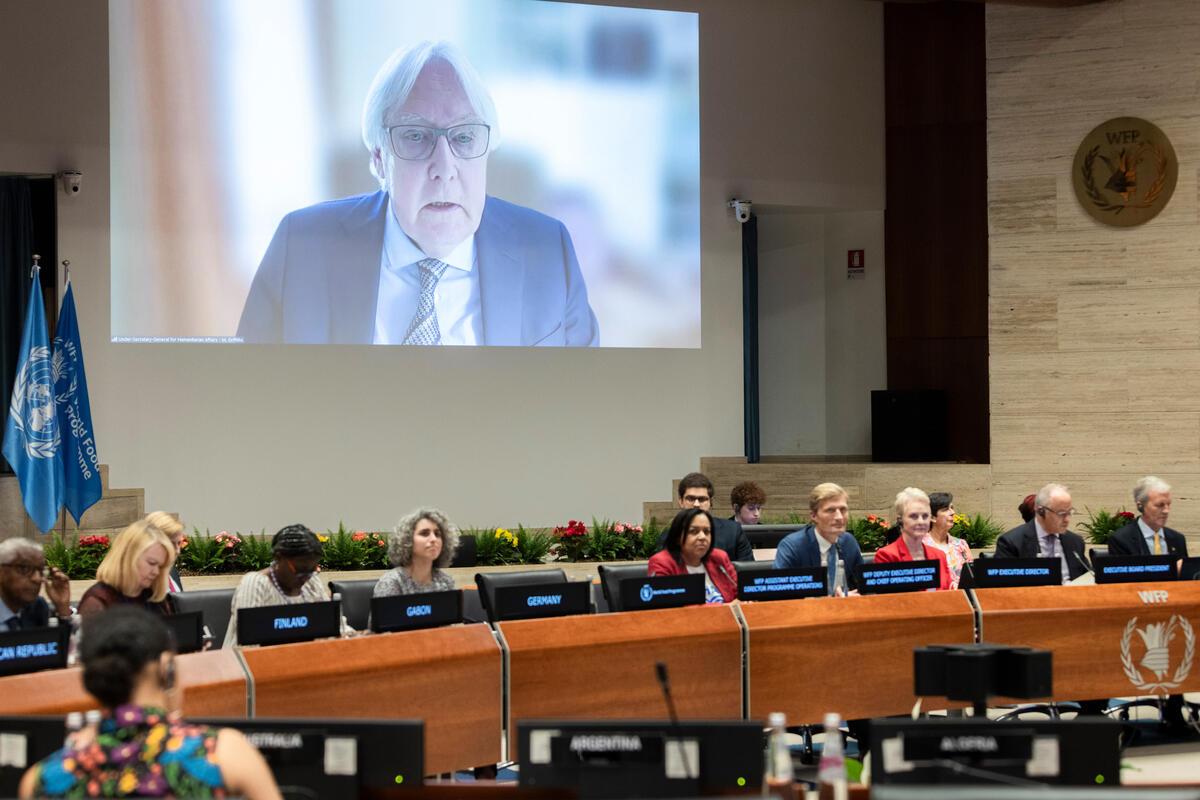
Intervention by Mr. Martin Griffiths, Under-Secretary-General for Humanitarian Affairs and Emergency Relief Coordinator - connected remotely. Photo: WFP/Matteo Minnella
Annual performance report for 2023, which provides a record of WFP’s performance for the past year and its progress towards the objectives identified in the strategic plan for 2022–2025 and the corporate results framework. The APR shows that WFP delivered assistance to more than 152 million people in 2023, despite humanitarian access challenges, significant funding shortfalls and operational and supply chain constraints. WFP received US$ 8.3 billion in 2023 against its approved needs-based plan of USD 22.8 billion, resulting in the organization’s highest recorded funding shortfall of 64 percent.
Audited annual accounts, 2023, comprising statements of financial position, financial performance, changes in net assets, cash flow and a comparison of budget and actual amounts, including a summary of significant accounting policies.
2023 Annual Evaluation Report and its management response. The report revealed WFP’s successful strategic shift from largely direct implementation of responses to food and nutrition insecurity to a more “enabling” role, supporting national partners in their search for hunger solutions while maintaining its traditional emergency response capacity. Among the areas for improvement: heavily earmarked funding, which constrains WFP’s ability to respond to contextual changes and plan for the medium term; poor alignment between staffing and the strategic needs of CSPs; insufficiently integrated programming; targeting or prioritization have led to a reduction in the rations or transfers with consequences on the food security levels of the most vulnerable.
Update to the management plan (2024-2026): taking note of the decreased contribution forecasts for 2024 from the US$10 billion reported in the WFP management plan (2024–2026) to US$8 billion, the Board approved a reduced programme support and administrative appropriation (PSA) budget of US$528 million for 2024.
Country strategic plans: The Board approved new country strategic plans for Guinea, Lesotho and Nicaragua. Following the approval of their respective CSPs, H.E. Mr. Ismael Nabe, Minister of Planning and International Cooperation of Guinea and Honourable Lejone Mpotjoana, Minister of Foreign Affairs and International Relations of Lesotho intervened and delivered statements on behalf of their governments.
Governance review: The Board also approved the Interim report of the Executive Board working group on the governance review which contains a costed implementation plan for a first set of recommendations that could be immediately implemented by the Secretariat, including conducting an annual one-day “strategic dialogue” to create a space for the membership and management to discuss strategic issues, restructuring the format and agendas of Board sessions, reinforcing the word limits of Board documents, redesigning the induction sessions for the Board and the Bureau, and implementing digital transformation initiatives.
Among the oral updates, the EB was informed on disability inclusion and the global assurance project which aims to ensure that WFP's assistance goes to the right people always, everywhere.
Click here to review all the documentation and here to read all decisions and recommendations.
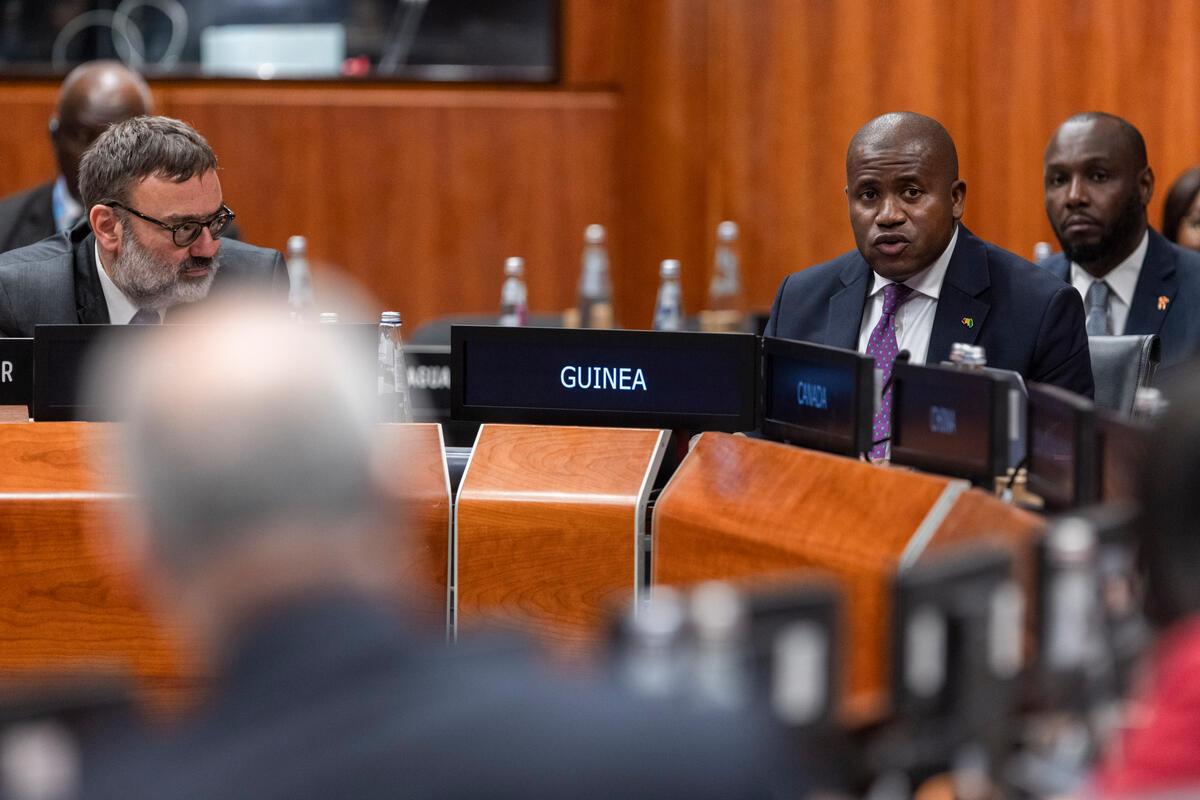
Intervention by H.E. Mr. Ismael Nabe, Minister of Planning and International Cooperation of Guinea.
During this session the following side events took place:
On Tuesday, 25 June, a side event on “How WFP's global data strategy accelerates the global fight against hunger” was held.
WFP’s first-ever Chief Data Officer, Mr. Magan Naidoo, moderated a discussion on WFP’s global data strategy and the use of well-managed data and new data-driven solutions to bridge the growing gap between humanitarian needs and resources and create innovative paths to achieving food security.
The event showcased new advancements in data analytics, artificial intelligence and machine learning and their use to accelerate the delivery of life-saving assistance and empower teams to maximize resource efficiency and achieve more with less.
Among the panelists were Ms. Meghan Latcovich, WFP Chief of Staff and Chair of Digital Business and Technology Committee, Ms. Betty Kaa, WFP Director of the Supply Chain and Delivery Division and Mr. Kenn Crossley, Country Director for the Syrian Arab Republic.
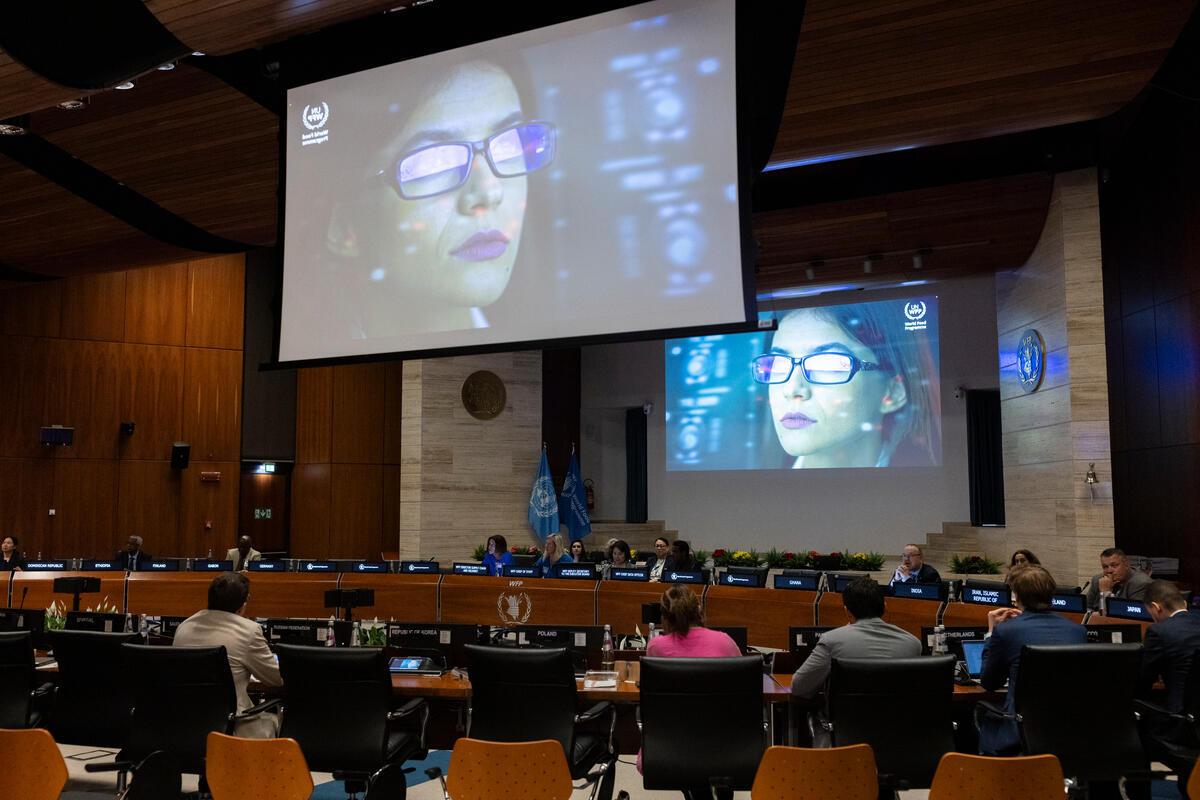
Side event "How WFP’s Global Data Strategy accelerates the global fight against hunger”. Photo: WFP/Matteo Minnella
On Wednesday, 26 June, a side event on “Artificial Intelligence (AI) for Humanitarian Action” took place.
Following the opening remarks by Ms. Cindy McCain, WFP Executive Director, Ms. Meghan Latcovich, WFP Chief of Staff and Chair of the Digital Business Technology Committee, moderated a discussion on ongoing AI investments in the humanitarian sector.
The panelists presented examples of AI applications for humanitarian operations, shared lessons learned and anticipated future benefits, including proactive response, timely decision-making, increased productivity and reduced costs.
Key considerations included governance and regulatory requirements, capability requirements, data management, privacy and ethics, risk management, and fostering behavioral change across the organization. Speakers also emphasized the pivotal role of partnerships in AI and technology and showcased examples of ongoing collaborations with Google, Oxford University and other key stakeholders.
The event featured Mr. Jean-Martin Bauer and Ms. Lauren Landis, WFP Country Directors of Haiti and Kenya, as well as practitioners in the government and technology industry such as Mr. Jason Hickey, Head of Research in Ghana for Google Inc., Dr Mark Latonero, Head of International Engagement at U.S. Artificial Intelligence Safety Institute and Mr. Guy Shalev, Lead AI Researcher at Google Inc.
On Thursday, 27 June, the Board members were invited to the side event entitled “South-South and Triangular Cooperation (SSTC): Nurturing Partnerships and Shared Solutions”
Following an introduction from Mr. George Fominyen, WFP Deputy Director of the Communications and Media Office, and ED’s opening remarks, Mr. Stanlake Samkange, WFP Director of Multilateral and Programme Country Partnerships Division, opened a discussion on SSTC as a mechanism for addressing SDGs 2 and 17.
A panel composed by H.E. Mr. Ismael Nabé, Minister of Planning and International Cooperation of the Republic of Guinea, H.E. Ms. Carla Barroso Carneiro, Ambassador and Permanent Representative of Brazil and H.E. Dr. Guang Defu, Ambassador and Permanent Representative of China offered their perspectives on SSTC and WFP’s role in supporting governments achieve their development objectives.
Two exhibitions were also held during the week.
On Tuesday, 25 June, the exhibit “Individual Fundraising 2024 and Beyond” was launched in the Red Foyer.
The exhibit illustrated the journey of the Individual Fundraising programme at WFP, from its inception in 2020 until today. It showcased WFP’s remarkable success in raising more than US$360 million cumulatively over the years by reaching individual donors by various means: the ShareTheMeal app, WhatsApp channel, emails, television commercials and social media ads.
The exhibition also described the successful partnership between WFP and WFP USA, the Japan Association for WFP (JAWFP), and other partners and celebrities to reach donors from around the world.
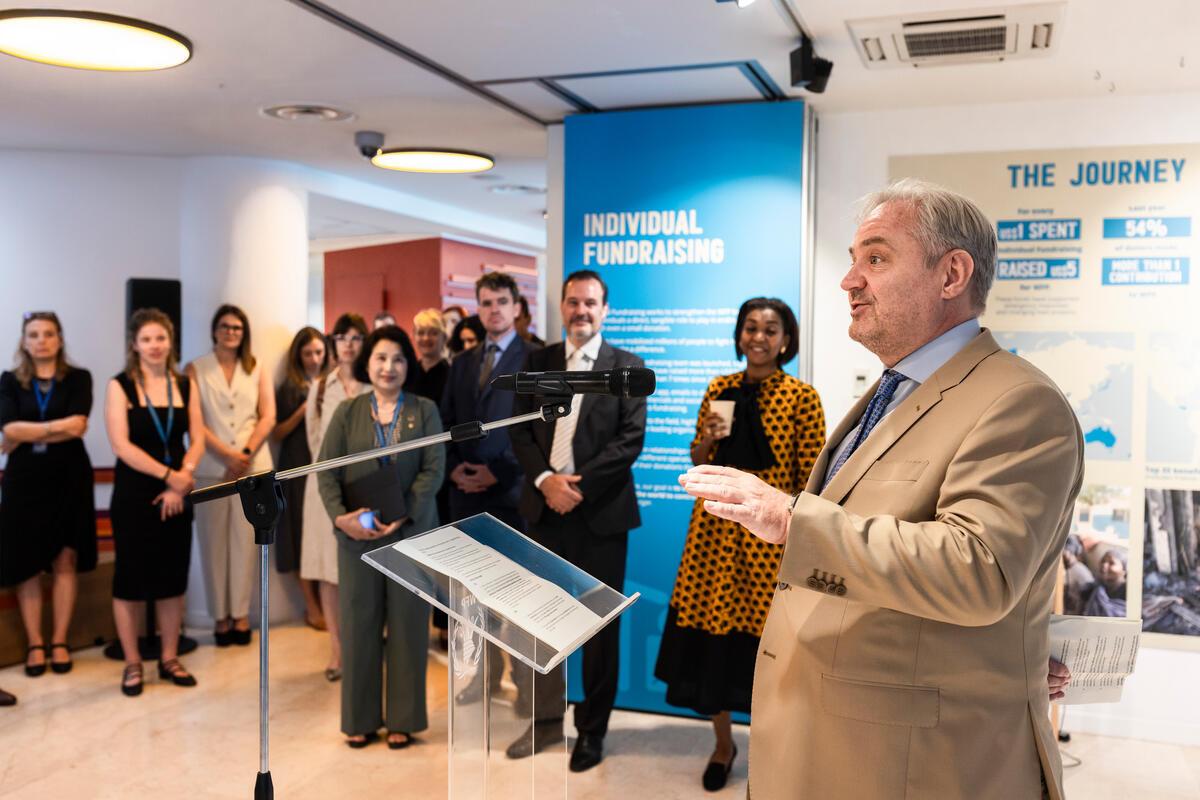
Launch of exhibit “Individual Fundraising – 2024 and beyond”. Photo: WFP/Matteo Minnella

